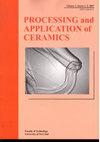水热老化3Y-TZP陶瓷在四点弯曲试验中的循环疲劳行为
IF 0.8
4区 材料科学
Q3 MATERIALS SCIENCE, CERAMICS
引用次数: 1
摘要
由于咀嚼过程中产生的循环机械应力,疲劳是陶瓷种植体中需要考虑的最重要的特性之一。在这项工作中,研究了用3mol% Y2O3 (3Y-TZP)稳定的水热降解zro2基陶瓷的四点弯曲试验的疲劳行为。3Y-TZP样品被压实(100MPa),在1475℃下烧结2小时,在ISO-13356标准中描述的高压釜中抛光和水热降解。通过相对密度、晶相组成、显微组织和表面粗糙度对样品进行表征。高密度(>99.6%TD)烧结的3Y-TZP陶瓷即使经过水热时效也只有四方的t-ZrO2相。陶瓷材料的维氏硬度为12.7 ~ 0.2GPa,断裂韧性为7.1 ~ 0.3MPa。m1/2, 4点抗弯强度为940.1?67MPa。根据弯曲试验结果,选择5种不同的应力水平进行疲劳试验,进行循环4点弯曲,得到S-N曲线。采用威布尔统计进行统计分析。疲劳试验表明,这种3Y-TZP陶瓷的抗疲劳极限约为550MPa,即高于ISO-13356标准中使用Y-TZP陶瓷制造植入物的极限。所研究的3Y-TZP陶瓷的疲劳行为与作用于Y-TZP陶瓷中的增韧机制有关,如与t?M相变和微裂纹。本文章由计算机程序翻译,如有差异,请以英文原文为准。
Cyclic fatigue behaviour of hydrothermally aged 3Y-TZP ceramics in 4-point bending tests
Fatigue is one of the most important properties to be considered in ceramic dental implants due to cyclic mechanical stresses arising from the chewing process. In this work, the fatigue behaviour of hydrothermally degraded ZrO2-based ceramics stabilized with 3mol% Y2O3 (3Y-TZP) was studied in 4-point bending tests. Samples of 3Y-TZP were compacted (100MPa), sintered at 1475 ?C for 2 h, polished and hydrothermally degraded in an autoclave as described in the ISO-13356 standard. The samples were characterized by their relative density, crystalline phase composition, microstructure and surface roughness. The highly dense (>99.6%TD) sintered 3Y-TZP ceramics has only tetragonal t-ZrO2 phase, even after hydrothermal ageing. Furthermore, the ceramic materials presented a Vickers hardness of 12.7?0.2GPa, a fracture toughness of 7.1?0.3MPa?m1/2 and a 4-point bending strength of 940.1?67MPa. Based on the bending test results 5 different stress levels for the fatigue tests were selected and conducted by cyclic 4-point bending obtaining the S-N curve. Weibull statistics was used for the statistical analysis. The fatigue tests indicate that the limit of fatigue resistance of this 3Y-TZP ceramics is around 550MPa, i.e. higher than the limits established in the ISO-13356 standard for the use of Y-TZP ceramics for the manufacture of implants. The fatigue behaviour of the investigated 3Y-TZP ceramics was related to the toughening mechanisms acting in Y-TZP ceramics, such as transformation toughening related to t?m phase transformation and microcracking.
求助全文
通过发布文献求助,成功后即可免费获取论文全文。
去求助
来源期刊

Processing and Application of Ceramics
MATERIALS SCIENCE, CERAMICS-
CiteScore
1.90
自引率
9.10%
发文量
14
审稿时长
10 weeks
期刊介绍:
Information not localized
 求助内容:
求助内容: 应助结果提醒方式:
应助结果提醒方式:


